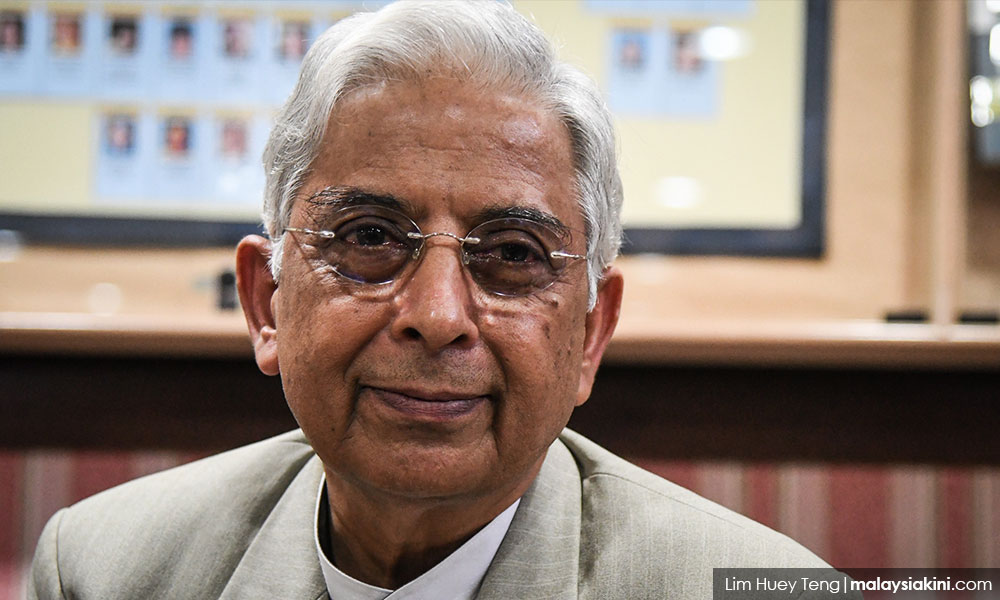
Amid the ongoing debate between Prime Minister Dr Mahathir Mohamad and the Johor palace, constitutional expert Shad Saleem Faruqi pointed out that the time when monarchs possessed absolute power had passed.
The Universiti Malaya emeritus law professor noted how some, including scholars, were still dwelling in this bygone era.
"We are a constitutional monarchy, not an absolute monarchy. There are people who are talking about 'kuasa mutlak' (absolute power). There is no 'kuasa mutlak' anymore," he told Malaysiakini.
Shad Saleem also said that Malaysian states are not sovereign, but "units of the federation" that are subject to one Federal Constitution.
"So, all this talk of state sovereignty is more (about) politics than law," he added.
Although he said Mahathir might have "overstated" his latest claim that the Johor and Terengganu state constitutions were nullified with the formation of the Federation of Malaya, he, however, agreed with the prime minister on the supremacy of the Federal Constitution.
'Void to the extent of inconsistency'
He explained that provisions in state law, and not the entire document, were void only if they contradicted the Federal Constitution.
"In essence, the prime minister's stand is correct, but he overstated the case that the (state) constitutions are nullified.
"We have to bear this in mind, he is a doctor, he is not a law graduate. So, I don't think he should be [judged] by the standard of a lawyer," he added.
Shad Saleem cited Articles 4 (1) and 162 (6) of the Federal Constitution, which stipulate that the document is the supreme law of the country and how every inconsistent law was “void” and needed to be fixed.
Should a state law not be in line with the Federal Constitution, he said, Article 71 (4) stated that the Dewan Rakyat had the power to change it.
"That means if the state constitution is either violating the federal constitution or if the state constitution has gaps, the federal parliament can enter the picture by ordinary law at the federal level and amend the state constitution to ensure compliance with the federal constitution," he added.
Federal provisions for state constitutions
Shad Saleem also drew attention to the Eighth Schedule of the Federal Constitution, which contains a list of provisions for state constitutions.
Among the provisions were that monarchs are to act on the advice of the state's executive branch of government, namely the menteri besar and the executive council.
"The appointment of the executive council is on the advice of the menteri besar, it is not the discretion of the sultan," he added.
Meanwhile, lawyer New Sin Yew also agreed with Shad Saleem regarding Mahathir's use of the term "nullified".
"I am not sure if 'nullified' is the right word to use. The Johor and Terrenganu state constitutions are still there, though with significant changes post-independence," he told Malaysiakini.

Johor's constitution was established in 1895, while Terengganu's constitution was drawn up in 1911.
However, New said the prime minister was correct in stating that the Federal Constitution is the supreme law of the land.
"It is important that everyone concerned respects the constitution and abides by it. Failure to do so would negate the rule of law," he added.
Rulers used to preside exco meetings
Before Aug 31, 1957, New said state constitutions contained provisions where the ruler presided over an executive council.
He added that the ruler was advised by an executive council and by a council of state which the menteri besar presided over.
"The menteri besar was appointed and is responsible to the ruler. The ruler had the power to overrule the executive council and the council of state. In this sense, rulers pre-Merdeka were not constitutional rulers.
"However, this changed at independence," he noted.
When the Federal Constitution came into force on Aug 31, 1957, New said all states, including Johor and Terengganu, were required to bring their respective state constitutions in line with the Federal Constitution.
"Article 71 of the Federal Constitution requires state constitutions to contain essential provisions as set out in Part I of the Eighth Schedule. Among the essential provisions are - ruler to act on advice, proceedings against the ruler, the executive council, and the legislature of the state.
"The purpose of Article 71 is to transform the role of the rulers into constitutional rulers who have limited powers and are bound to accept and act on the advice of the menteri besar or executive council.
"If a state constitution does not contain the essential provisions or if a state constitution contains provisions which are inconsistent with the essential provisions, Parliament may make law to give effect in that state to the essential provisions or to remove the inconsistent provisions in the state constitution.
"As a result, all states must have the necessary amendments to their state constitutions post-independence. All state constitutions now contain essential provisions and all rulers are now constitutional rulers," he added.
New said this was the bargain struck at independence and with the agreement of all rulers where a system of constitutional government would be introduced. - Mkini


No comments:
Post a Comment
Note: Only a member of this blog may post a comment.